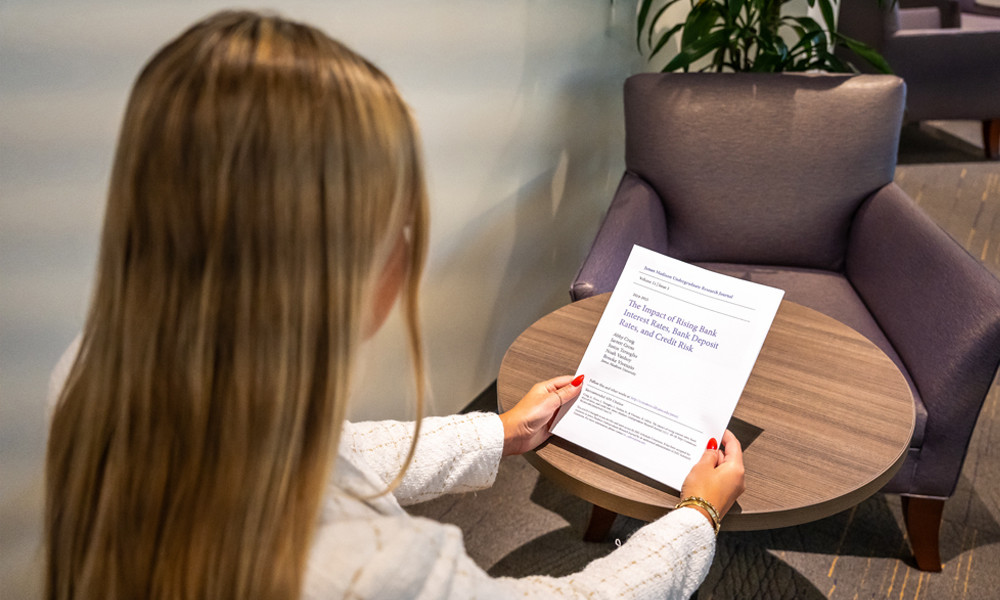Undergraduate Research Journal publishes banking team’s paper
News
SUMMARY: Members of JMU’s Banking Team draw important lessons from their collaboration on a study of banks’ response to interest-rate movements.
A scholarly paper which earned for JMU business students a berth in the championship round of the Federal Deposit Insurance Corp.'s "Academic Challenge," has now been published in the 2024-25 edition of the James Madison Undergraduate Research Journal (JMURJ).
The JMURJ is a student-run, multidisciplinary, peer-reviewed publication. Its purpose is to promote and share research by James Madison University undergraduates across all fields of study.
Volume 11 of the JMURJ, which appeared in early September, includes a paper originally submitted for the 2023 presentation of the FDIC Academic Challenge in Alexandria, Virginia. Titled "The Impact of Rising Bank Interest Rates, Bank Deposit Rates, and Credit Risk," it was co-authored by students Abby Craig, Jarrett Grose ('23), Justin Tersoglio ('24), Noah Vanhoy ('23) and Brooke Vivenzio ('23) – the five members of that year’s JMU Banking Competition Team.
Producing the paper “during such an impactful period for interest rates,” said Craig, a current Finance major, “was the best possible way for me to learn how the banking sector operates during times of economic uncertainty.”
The research she and her co-authors conducted made it possible for them “to learn firsthand from experts about the impact of interest-rate movements and the many aspects of regulation and deposit insurance that pose challenges for the FDIC every day,” she said.
Favorable reception of the paper by the contest judges enabled the JMU team to come within a razor-thin margin of winning the FDIC "Academic Challenge" for a second consecutive year.
Carl Larsson, associate professor of Finance, served as the team's advisor. “The goal of the Banking Team program,” said Larsson, “is for the students to grow personally and professionally by working together in the context of a challenging, team-based competition.”
He added that “the team not only achieved its goal for the year but also got to visit the FDIC, meet with regulators and present their research to a panel of banking-industry experts.”
In the paper, the members of the JMU team explored how different types of financial institutions respond to changes in the federal funds rate, which is set by the Federal Open Market Committee. This rate serves as the basis for the setting of all such rates within the U.S. economy.
Specifically, the paper’s authors compared the responses of “hot-money banks” – large commercial banks which focus on attracting deposits using the interest rates paid on those deposits – with the rates paid by smaller, community-based lenders.
The authors found that hot-money banks respond more quickly to changes in the federal funds rate, while community banks respond more deliberately.
The authors also assessed the risks incurred by borrowers who use “fin-tech” platforms such as Ally Bank, which lack brick-and-mortar infrastructure. They compared these risks with those for traditional commercial banks and concluded that consumers who use fin-tech firms are exposed to greater credit risk.
The purpose of the annual Academic Challenge, according to the FDIC, is to enhance students’ professional and academic skills by promoting analytical thinking, graphical and oral presentation of information and concepts, and collaboration with peers.
Speaking of his own two-year run as a member of the JMU team, Vanhoy, a Finance graduate, said, “I learned more about the financial system and current events in the banking sector than I ever thought possible.”
Vanhoy’s teammate Craig, now on-track to graduate in May 2025, says the experience she gained from helping write and present the paper is the primary reason she is being offered so many appealing opportunities as she prepares to embark on her career.
“The fundamental knowledge of the banking industry I acquired is really helping me in my job interviews.”
